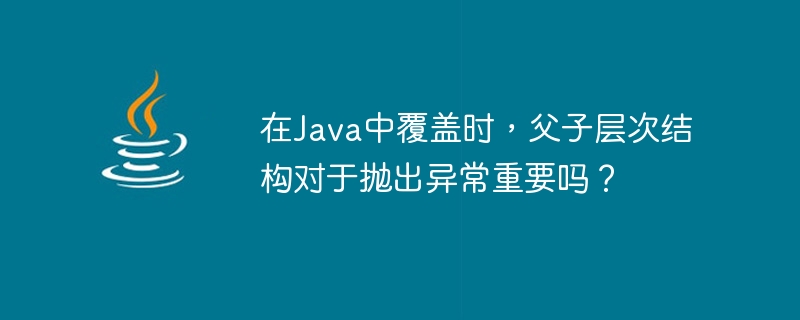Home >Java >javaTutorial >Is parent-child hierarchy important for throwing exceptions when overriding in Java?
Is parent-child hierarchy important for throwing exceptions when overriding in Java?
- WBOYWBOYWBOYWBOYWBOYWBOYWBOYWBOYWBOYWBOYWBOYWBOYWBforward
- 2023-08-19 13:49:231414browse

When you try to handle a (checked) exception thrown by a specific method, you need to catch it using the Exception class or the superclass where the exception occurred .
Similarly, when overriding a method of a super class, if it throws an exception −
The method in the subclass should throw the same exception or its subtype .
Methods in subclasses should not throw out of their supertype.
You can override without throwing any exception.
When you have three classes (hierarchies) named Demo, SuperTest and Super that inherit, if Demo and SuperTest have a class named sample() method.
Example
Real-time demonstration
class Demo {
public void sample() throws ArrayIndexOutOfBoundsException {
System.out.println("sample() method of the Demo class");
}
}
class SuperTest extends Demo {
public void sample() throws IndexOutOfBoundsException {
System.out.println("sample() method of the SuperTest class");
}
}
public class Test extends SuperTest {
public static void main(String args[]) {
Demo obj = new SuperTest();
try {
obj.sample();
}catch (ArrayIndexOutOfBoundsException ex) {
System.out.println("Exception");
}
}
}Output
sample() method of the SuperTest class
If the class you catch the exception is not the same as the exception thrown or is not the superclass of the exception, You will get a compile time error.
Similarly, when overriding a method, the exception thrown should be the same as the exception thrown by the overridden method or its superclass, otherwise a compile-time error will occur.
Example
Demonstration
import java.io.IOException;
import java.io.EOFException;
class Demo {
public void sample() throws IOException {
System.out.println("sample() method of the Demo class");
}
}
class SuperTest extends Demo {
public void sample() throws EOFException {
System.out.println("sample() method of the SuperTest class");
}
}
public class Test extends SuperTest {
public static void main(String args[]) {
Demo obj = new SuperTest();
try {
obj.sample();
}catch (EOFException ex){
System.out.println("Exception");
}
}
}Output
Test.java:12: error: sample() in SuperTest cannot override sample() in Demo
public void sample() throws IOException {
^
overridden method does not throw IOException
1 error
D:\>javac Test.java
Test.java:20: error: unreported exception IOException; must be caught or declared to be thrown
obj.sample();
^
1 errorThe above is the detailed content of Is parent-child hierarchy important for throwing exceptions when overriding in Java?. For more information, please follow other related articles on the PHP Chinese website!
Related articles
See more- How to Continuously Update a JLabel Using Swing Timer and SwingWorker?
- How to Group Java 8 Nested Objects by Multiple Keys Using Collectors?
- Here are a few title options, maintaining the question format: * How to Seamlessly Integrate Java into Python: A Comprehensive Guide to Choosing the Right Approach * Python Calling Java: Which Metho
- How to Merge Firestore Queries Locally Using Tasks?
- Why and How Should You Synchronize on String Objects in Java?

